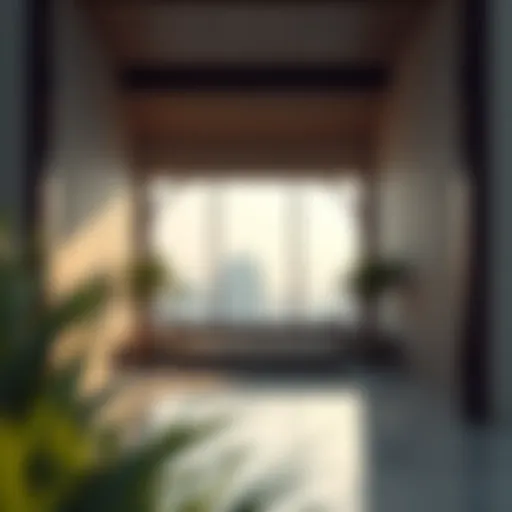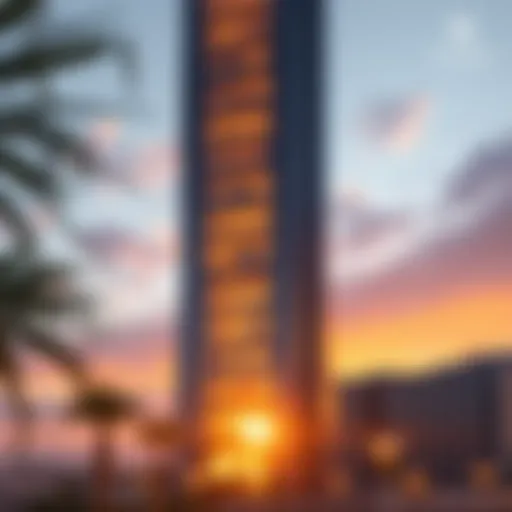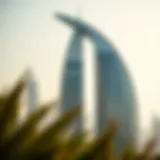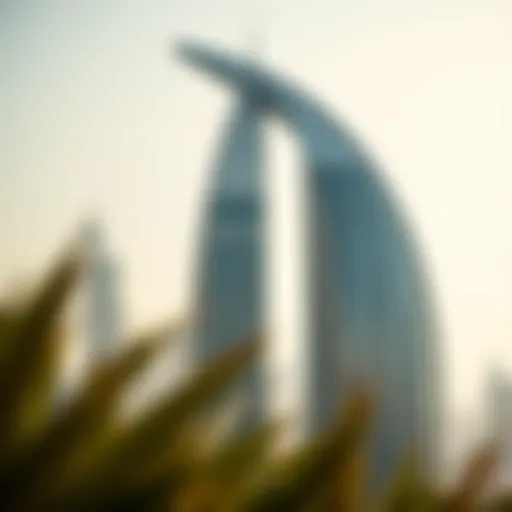Exploring Al Habtoor Real Estate: A Dubai Perspective
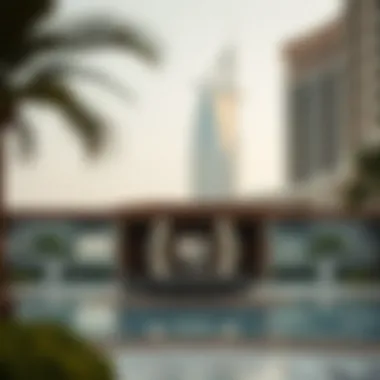

Intro
The landscape of real estate in Dubai is a vibrant mosaic, with numerous players driving the sector's dynamic growth. Among them, Al Habtoor Real Estate stands out as a prominent entity, shaping the skyline and influencing property trends in this bustling metropolis. Understanding its role requires a closer look at its history, key projects, and overall impact on the market. This exploration will unravel aspects ranging from luxury developments to investment opportunities, all critical for anyone looking to navigate the complex terrain of Dubai's property sector.
Market Trends and Insights
Current Market Analysis
With Dubai's real estate market rebounding post-pandemic, investors are keenly observing trends that signal where the sector is headed. Al Habtoor Real Estate exemplifies the shift towards sustainable practices, often incorporating eco-friendly designs in its projects. This focus not only appeals to environmentally conscious buyers but also enhances property value in the long run.
- Luxury apartments in central locations like Dubai Marina continue to see high demand, driven by both local and international buyers seeking premium living experiences.
- Commercial spaces, particularly in areas like Business Bay, are becoming more vital as firms adapt to hybrid working models, highlighting the need for flexible office designs.
The steady flow of foreign investments, particularly from Europe and Asia, indicates Dubai's allure as an investment hub. With an influx of expatriates, rental yields remain attractive, making properties developed by Al Habtoor a wise choice for investors looking to maximize their returns.
Historical Trends and Future Predictions
Historically, Al Habtoor Real Estate has demonstrated resilience in fluctuating markets. The firm has evolved, reacting adeptly to economic shifts. For instance, after a brief downturn during economic slowdowns, it pivoted to delivering projects that focus on community living, a trend that has gained traction in recent years.
Looking ahead, stakeholders predict a surge in demand for integrated lifestyle developments. Properties that offer residential, retail, and leisure experiences all in one place will likely dominate the market. With the UAE aiming for sustainable urban development, Al Habtoor is well-positioned to lead this charge by continuing to innovate in the luxury and community housing sectors.
"As urbanization increases, the need for multi-functional, environmentally sustainable living spaces will dictate future real estate trends."
Property Listings and Comparisons
Luxury Properties Overview
Al Habtoor's portfolio showcases an impressive array of luxury properties, tailored for discerning buyers. Each development tells a story of elegance, comfort, and modernity. Notable projects include the Habtoor Palace, a luxury hotel and residences providing exquisite direct access to the city’s attractions, and The Residence Collection, known for its spacious layouts and high-end finishes.
- Habtoor Palace: Features opulent interiors and top-notch amenities, catering to those wanting both luxury and convenience.
- The Residence Collection: Offers unparalleled views and state-of-the-art facilities, ideal for families and professionals alike.
Affordable Housing Options
Despite its reputation for luxury, Al Habtoor Real Estate also recognizes the need for affordable housing solutions. This segment remains crucial as Dubai aims to cater to a broader audience. Projects in this area focus on quality yet budget-friendly finishes, allowing for diverse buyer demographics.
- Community housing: Tailored developments aim at young families, with easy access to schools, parks, and essential services.
- Mid-range apartments: Strategically positioned, these properties cater to those seeking the Dubai lifestyle without breaking the bank.
For those interested in delving deep into the specifics of Dubai's fast-evolving real estate market, platforms like The National or Property Finder can offer valuable insights.
Intro to Al Habtoor Real Estate
In the bustling metropolis of Dubai, Al Habtoor Real Estate has carved a significant niche for itself within the property development sector. Understanding this company is essential, not just from an investment perspective but also for appreciating the broader real estate landscape in which it operates. This section will break down the company into digestible facets, offering insights into its essence and the role it plays in shaping Dubai’s skyline and economy.
Company Overview
Al Habtoor Real Estate was established as a part of the Al Habtoor Group, a conglomerate that has been pivotal in the UAE's development. Founded by Khalaf Ahmad Al Habtoor in 1970, the group initially focused its efforts on construction and hospitality before diversifying into real estate. Today, the company boasts a diverse portfolio, encompassing residential, commercial, and hospitality ventures that reflect luxury and innovation.
What sets Al Habtoor apart? It operates with a fine blend of tradition and modernity, taking cues from local culture while adopting global best practices. The company's developments are not merely structures; they represent a lifestyle that resonates with the aspirations of a cosmopolitan demographic, blending elegance with functionality. Each property proudly showcases the hallmark of quality construction and sophisticated design.
Mission and Vision
At the heart of Al Habtoor Real Estate lies its mission and vision, guiding its strategy and growth. The company aims to redefine luxurious living space by focusing on sustainability while heightening the experience of customers and investors alike. By ensuring that every development meets the highest standards, they position themselves as a frontrunner in a highly competitive market.
The vision encapsulates a deep commitment toward not only enhancing the physical environment through exquisite real estate projects but also nurturing communities. Al Habtoor's foresight is directed toward future generations, ensuring that sustainable practices are woven into the fabric of each development. This insight plays a crucial role for potential investors, who must consider company values aligned with broader societal goals.
"Sustainable growth is not just about profits; it's about creating spaces that thrive for generations to come."
These guiding principles shape how Al Habtoor operates—from construction practices that prioritize eco-friendliness to fostering community-enhancing projects that contribute cultural and social value. By marrying ambition with responsibility, Al Habtoor Real Estate stands as a paragon for others in the industry, making its ongoing expansion significant for prospective clients, realtors, and investors.
In summary, the introduction of Al Habtoor Real Estate provides a glimpse into its significance in Dubai’s real estate ecosystem. By examining the company’s fundamentals, we lay the groundwork for understanding its historical footprints, market presence, and future trajectory in subsequent sections.
Historical Background
Understanding the historical background of Al Habtoor Real Estate offers crucial insights into its operational ethos and its knit in Dubai's vibrant real estate landscape. The roots of a company often determine its trajectory, values, and impact, making this examination a key component of the discussion. Al Habtoor’s history is a narrative laced with ambition and resilience, reflecting the rapid transformation of not just the company, but the entirety of Dubai itself.
Founding and Development
Al Habtoor Real Estate was established in the late 1970s, emerging from the vision of Khalaf Ahmad Al Habtoor, who saw potential where many viewed mere desert expanse. The company began its journey focusing primarily on construction and general contracting. This early phase was characterized by handshakes and local partnerships, fostering relationships that would become the bedrock of its future successes.
As the nation embraced its newfound wealth from oil, Al Habtoor quickly recognized the potential in real estate development. The first major project was the construction of the iconic Al Habtoor Grand Resort and Spa, which heralded a new era for the company. The resort not only showcased luxury but also set the tone for what was to follow—a reflection of the luxurious lifestyle Dubai was beginning to offer to both residents and visitors alike.
The company’s approach was marked by unwavering commitment to quality and innovation. Building on this foundation, Al Habtoor expanded into various sectors, including hospitality and education, ultimately diversifying its portfolio significantly. Each project echoed the advancement of Dubai as a world-class destination, cementing Al Habtoor’s status as one of the leading real estate developers in the region.
Evolution Over the Years
The evolution of Al Habtoor over the years is a testament to the company's adaptability and foresight. As Dubai transformed into a metropolis, Al Habtoor Real Estate adapted to meet emerging market demands. New developments, from high-rise residential towers to sprawling commercial spaces, began to dot the skyline. Each new venture was a strategic response to market trends, underscoring the company’s role in shaping the city’s architectural landscape.
In the 1990s, the company further expanded its reach internationally, venturing into markets in Europe and beyond. This move was not merely about geographical expansion; it was about learning from global best practices in real estate development and infusing those lessons back into their projects in Dubai. By establishing Al Habtoor in other markets, the company enhanced its understanding of the competitive nature of real estate, ensuring that their projects remained ahead of the curve.
Moreover, as societal values shifted towards sustainability and eco-conscious living, Al Habtoor meticulously reevaluated its development strategies. Investing in green technologies and eco-friendly practices became imperative. The company launched several initiatives, such as green building certifications and energy-efficient designs, ensuring its developments were not just luxurious, but also responsible.
Today, the story of Al Habtoor is one of adaptability. As the real estate landscape continues to evolve, marked by the rise of smart technologies and ever-changing consumer preferences, Al Habtoor remains poised for growth. Its historical journey reflects a commitment to excellence and a readiness to redefine standards in the Dubai real estate market.
"History is not merely about the past. It's about understanding how the past shapes our future." - Inspired by the narrative of Al Habtoor Real Estate.
Learn more about real estate development in Dubai here.
Find out about sustainability in real estate to see how Al Habtoor aligns with modern values.
Key Properties and Developments
Understanding Key Properties and Developments is crucial when examining Al Habtoor Real Estate. This segment showcases the company’s impact on Dubai’s dynamic real estate market and highlights its diverse portfolio. Through luxury residences, commercial spaces, and hospitality ventures, Al Habtoor shapes the urban landscape. By reviewing these specific segments, anyone can appreciate the strategic importance of Al Habtoor’s offerings.
Luxury Residences
Palatial Estates
When considering Palatial Estates, one cannot ignore the grandeur that defines these properties. Al Habtoor embeds luxury in every inch, making these estates synonymous with opulence and sophistication. The key characteristic of these estates is their sizeable layouts coupled with unparalleled amenities. It serves as a beacon for affluent buyers who desire a lifestyle of comfort and exclusivity.


A unique feature of Palatial Estates is the private gardens, which provide serenity amid the bustling city. This lush green space creates an oasis for relaxation, adding to the property's appeal. However, properties of this stature can require significant maintenance, demanding time and resources from the owners. Still, many find the investment worthwhile, with properties often appreciating significantly in value.
Modern Apartments
Delving into Modern Apartments reveals a distinct blend of contemporary design and functionality. These residences cater to a broader demographic, from young professionals to families seeking urban living. Their appeal lies in the ideal combination of modern aesthetics and practical layouts, aligning with the ever-evolving demands of city dwellers.
A standout feature of these apartments is the integration of smart technologies that offer convenience and security to residents. While the cost may be higher than traditional apartments, the long-term benefits, such as energy efficiency and increased property value, often justify the expense. This trend reflects a growing consumer preference for modern living spaces that enhance daily life.
Commercial Spaces
Offices
Turning attention to Offices, Al Habtoor focuses on creating workspaces that fuel productivity. The importance here lies not only in the aesthetic appeal but also in the functionality and adaptability of these spaces. Businesses recognize that a well-designed office environment positively impacts employee morale and efficiency.
The key characteristic of Al Habtoor's office developments is their strategic location in areas with high business activity. This makes them particularly attractive for startups and established companies alike. A unique aspect of these offices is the flexibility to configure spaces according to tenants' needs. However, potential lessees should be aware of the associated rental costs, which can be substantial depending on the location and features. Still, the return on investment often validates these expenses through increased operational productivity.
Retail Outlets
With Retail Outlets, Al Habtoor emphasizes curated shopping experiences. These outlets blend luxury brands with vibrant local retailers, drawing in diverse shoppers. The essence here is not just about shopping; it’s about offering lifestyle experiences that resonate with today’s discerning consumers.
A notable feature of these retail spaces is their design, which often includes open layouts and inviting communal areas. This creates an atmosphere conducive to browsing and lingering, attracting more foot traffic. While the success of retail outlets can be influenced by market trends and consumer behavior, their strategic placements generally ensure steady patronage. For brands, being housed in these developments often translates into increased visibility and sales.
Hospitality Ventures
Hotels and Resorts
Hospitality Ventures position Al Habtoor as a significant player in Dubai's tourism sector. The hotels and resorts designed by the company reflect a commitment to luxury and unparalleled service. A major draw here is their ability to cater to both leisure and business travelers, enhancing Dubai’s reputation as a global destination.
The key characteristics of these establishments are their lavish facilities and world-class amenities, including spas, fine dining, and event spaces. One unique aspect is their commitment to unique designs that reflect the local culture while still providing modern luxuries. However, with luxury comes higher operating costs, potentially impacting profit margins. Still, the brand's strong reputation attracts a consistent flow of guests, ensuring sustained profitability.
Sustainable Tourism Initiatives
Focusing on Sustainable Tourism Initiatives reveals Al Habtoor's proactive approach to environmental responsibility. Here, the contribution lies in promoting practices that protect the environment while enhancing guest experiences. In today’s market, travelers increasingly prefer accommodations that demonstrate a commitment to sustainability.
A key characteristic of these initiatives is the integration of green technologies in their properties. For example, solar energy systems and waste reduction programs enhance operational efficiency and appeal to eco-conscious travelers. Although the investments in these sustainable practices can be significant, they often pay off in terms of brand loyalty and market positioning. This forward-thinking approach places Al Habtoor at the forefront of a global movement toward responsible tourism, ensuring long-term success.
Market Position and Competition
In the complex realm of property development, market position and competition are not just buzzwords; they are fundamental pillars that define a company’s effectiveness and long-term sustainability. For Al Habtoor Real Estate, understanding its position relative to competitors sheds light on its strategic decisions, influences potential investors, and assists homebuyers in making informed choices. Analyzing industry standing and competition offers insights into the vibrancy and robustness of the Dubai real estate market, helping to chart a course for future developments and investments.
Industry Standing
Al Habtoor Real Estate is perched on a significant height in the competitive landscape of Dubai’s property market. The company has carved a niche for itself primarily through its portfolio that melds luxury with architecture that speaks to the heart of modern living. Key elements that contribute to its esteemed standing include:
- Reputation and Trust: The brand has cultivated a reputation for quality through decades of delivering on promises. Clients feel reassured when they consider investing in properties from a trusted name.
- Diverse Portfolio: The blend of luxury residences, commercial spaces, and hospitality ventures positions Al Habtoor as a well-rounded player in the market. This diversification not only mitigates risk but also captures varied segments of the real estate landscape.
- Innovation: Keeping pace with technological advances, including smart home technologies, elevates its allure among tech-savvy buyers and investors.
By maintaining a solid industry standing, Al Habtoor not only commands higher prices but also enjoys a broader market share, which is crucial for maintaining a competitive edge.
Comparative Analysis with Competitors
When pitting Al Habtoor Real Estate against its competitors, it becomes apparent that several factors set it apart, though the competition remains fierce. Here’s how Al Habtoor measures up against other prominent players in the Dubai real estate scene:
- Quality of Developments: Al Habtoor’s projects, such as the Al Habtoor Palace and other luxury offerings, often outshine rival developments in terms of craftsmanship and design. Competitors may offer similar amenities, but the finish and cohesive overall vision often favor Al Habtoor.
- Market Responsiveness: The company has shown agility in adapting to various market trends, unlike some competitors who tend to stick rigidly to traditional models. Their responsiveness to buyer preferences, particularly in sustainable living, positions them favorably in a shifting market.
- Client Engagement: Through proactive buyer guidance resources and thorough after-sales support, Al Habtoor establishes lasting relationships with clients. This is contrasted with competitors who may offer a more transactional approach.
"Understanding where you stand relative to the competition can reveal hidden opportunities and inform strategic shifts necessary to thrive in a dynamic market."
Ultimately, the competitive landscape in Dubai's real estate sector is not just about who builds the tallest tower; it's about who understands the market dynamics and the needs of buyers the best. Al Habtoor's proven track record reflects a deep understanding of these elements, positioning the brand favorably as it navigates future challenges and opportunities.
Through a keen analysis of both its standing and competition, Al Habtoor continues to build a lasting legacy in Dubai’s multifaceted real estate landscape.
Investment Opportunities
Investment opportunities in Al Habtoor Real Estate are not only relevant but pivotal in understanding the dynamic landscape of Dubai’s property market. With the influx of international investors and the constant evolution of the local economy, individuals and entities alike find themselves enticed by the potential for growth and returns associated with Al Habtoor’s developments. In an era where real estate remains a cornerstone of wealth accumulation, recognizing the channels through which one can access these lucrative opportunities becomes essential.
Al Habtoor has established a reputation for creating properties that not only promise luxury and comfort but also resilience in value appreciation. Here’s a deeper look into the nuances of investment opportunities in this real estate venture.
Attractiveness of Al Habtoor Properties
The appeal of Al Habtoor properties lies primarily in their strategic positioning and innovative designs. Investors often find value in locations that not only boast accessibility but also a flourishing environment for potential tenants or buyers. Take, for instance, the luxurious estates in the heart of Dubai. The breathtaking skyline and proximity to iconic landmarks such as the Burj Khalifa and Dubai Mall enhance the desirability of these properties, drawing attention from affluent buyers both locally and globally.
- High-Quality Construction: Al Habtoor properties are synonymous with meticulous attention to detail and superior craftsmanship. This commitment to quality often translates to lasting value in the resale market.
- Diverse Portfolio: Whether one is eyeing luxurious residences or commercial spaces, Al Habtoor caters to various niches within real estate. This diversity can be attractive for investors seeking a balanced portfolio.
- Strong Brand Reputation: With decades of operation, Al Habtoor has built a solid brand that resonates trust and reliability. Investors tend to gravitate towards established brands, knowing they are less likely to run into pitfalls typical in real estate ventures.
Potential Returns on Investment
When it comes to potential returns on investment, Al Habtoor stands out due to several factors that enhance profitability. Real estate, especially in a bustling city like Dubai, has shown to be a sound investment choice over the years. Here are some key points to consider:
- Value Appreciation: Properties in well-located areas tend to appreciate significantly over time. Investors can expect their properties to not just hold value but potentially surge, driven by ongoing city developments and infrastructure improvements.
- Rental Income: The demand for both luxury and commercial properties continues to fuel rental markets. Investors can generate substantial income through leasing strategies, ensuring a steady cash flow.
- Government Incentives: The Dubai government frequently establishes initiatives designed to bolster foreign investment in real estate. Understanding these policies and how they align with Al Habtoor’s offerings can lead to favorable tax considerations, effectively increasing net returns.
- Trend Adaptations: As urban living evolves, Al Habtoor has shown the ability to adapt to market demands, incorporating smart technologies and sustainable practices, which can further heighten property values.
"Investing in properties developed by Al Habtoor is not just purchasing a home; it is acquiring a lifestyle that reflects luxury and a promising future."
Impact of Market Trends
Understanding the impact of market trends is critical in the realm of real estate, particularly in a dynamic environment like Dubai. The trends can influence everything from property prices to buyer preferences, making it essential for stakeholders to keep an eye on these shifts. Investors, realtors, homebuyers, and developers all stand to benefit from grasping the nuances of these trends as they navigate the ever-evolving landscape.
Market trends not only shape the present scenario but also provide a lens through which future directions can be anticipated. This section will delve into the current real estate trends shaping Dubai and will also make future projections that could inform strategies for investment and development.
Current Real Estate Trends in Dubai
Dubai's real estate market is in a state of constant evolution, driven by several key trends:
- Increased Demand for Ready Properties: There is a growing preference among buyers for ready-to-move-in properties. Potential homeowners and investors are often hesitant to venture into off-plan purchases due to perceived risks. Developers are responding by focusing on delivering completed projects, thus catering to this demand.
- Sustainability Focus: Amidst increasing awareness of environmental issues, eco-friendly initiatives have gained traction. Many developments in Dubai now incorporate sustainable building practices, enhancing energy efficiency and reducing environmental impact. This trend resonates well with both investors and end-users, as sustainability is becoming a selling point.
- Luxury Market Resurgence: Post-pandemic, the trend towards luxury properties has surged. High-net-worth individuals are increasingly looking for opulent residences that offer privacy and exclusivity, thus pulsating new life into the luxury segment of the market.
- Technological Integration: The adoption of smart home technologies and PropTech solutions is accelerating within the sector. This includes enhancements in security, efficiency, and overall living experience, making properties more attractive to tech-savvy buyers.
These trends illustrate that Dubai's real estate market continues to develop in ways that reflect both local desires and global influences. The connection between buyer behavior and market fluctuations is quite clear, underlining the importance of continuous market analysis.
Future Projections


Looking forward, several emerging trends stand out that could significantly impact Dubai’s real estate landscape:
- Continued Demand for Mixed-Use Developments: As lifestyles evolve, mixed-use developments are expected to become increasingly popular. Offering a blend of residential, commercial, and leisure spaces, these developments will cater to the desire for convenience and community living.
- Rental Market Strengthening: The rental market might experience a boost as people continue to prefer renting rather than buying. With a growing expat population and flexible living arrangements, the demand for rental units, particularly in prime locations, will likely remain robust.
- Tech-Driven Investment Services: As technology continues to permeate every facet of life, the real estate market will witness advancements in investment services. Automated platforms for buying and selling properties will enhance transparency and streamline transactions, making it easier for stakeholders to operate.
- Evolving Government Policies: Regulatory changes aimed at attracting foreign investment are expected to continue. Policies that simplify ownership structures or provide incentives could further encourage investment in the sector.
The interplay of these trends may influence market behaviors significantly. Stakeholders who can adapt to these shifts will position themselves favorably in a competitive and unpredictable market.
For further insights into Dubai's real estate dynamics, check out resources like Wikipedia and Britannica.
Regulatory Environment
Understanding the regulatory environment in any real estate sector is fundamental. In Dubai, where Al Habtoor Real Estate operates, these regulations not only shape the operation of companies but also impact buyers, investors, and the overall market dynamics. A well-defined regulatory framework serves as the backbone of a stable real estate market, providing the necessary guidelines for property transactions, development approvals, and consumer protections.
Real Estate Regulations in Dubai
Dubai's real estate regulations are designed to encourage investment while ensuring a transparent transaction process. One of the crucial elements is the Real Estate Regulatory Agency (RERA), which plays an instrumental role in overseeing the real estate sector. This organization ensures compliance with property laws, manages transaction registries, and protects the rights of buyers and sellers. The regulations cover various aspects, including:
- Property Registration: Mandatory registration of real estate transactions within a specified timeframe safeguards interests.
- Leasing Laws: The rental market is governed by laws that protect both landlords and tenants, ensuring fair practices.
- Ownership Regulations: Specific guidelines limit ownership types, especially regarding freehold and leasehold properties, clarifying who can own what.
- Development Approvals: All development projects need to receive approval, promoting adherence to safety and aesthetic standards.
Overall, these regulations ensure a balance between protecting investor interests and fostering a conducive environment for development.
Role of Government Initiatives
Government initiatives form an integral part of Dubai's real estate framework, supporting its ambition to be a global investment hub. Numerous programs have been introduced to attract investments and facilitate growth in the real estate sector.
Some noteworthy initiatives include:
- Long-Term Visa Programs: Offering extended residency options for foreign investors encourages long-term commitments in property ownership.
- Dubai Land Department Initiatives: Various campaigns and policies by the Dubai Land Department promote awareness and compliance with property laws.
- Incentives for Sustainable Developments: The government actively promotes green building practices, offering tax benefits or subsidies for projects that adhere to sustainability standards.
"The focus on regulation and government support creates a strong foundation for future developments, enabling Al Habtoor Real Estate to capitalize on these initiatives."
In summary, the regulatory environment, reinforced by effective government initiatives, shapes the stability and growth potential of the real estate sector in Dubai. For investors, realtors, and home buyers, understanding these elements is essential for navigating the market and making informed decisions.
Challenges in the Real Estate Sector
The landscape of real estate is a bit of a double-edged sword. While it offers fertile ground for booming investments and vibrant market opportunities, it also grapples with its fair share of challenges. These hurdles can significantly impact developers, investors, and stakeholders alike. In this section, we’ll delve into two primary challenges affecting the real estate sector: economic fluctuations and sustainability issues.
Economic Fluctuations
Economic fluctuations are like the ebb and flow of the tide — they can affect everything from property values to buyer sentiment. A robust economy usually boosts confidence, encouraging more investments in real estate. Conversely, during economic downturns, the perception shifts. Investors grow wary, and prospective buyers tend to hold their cards closer to their vests.
The Dubai market, while resilient, is not immune to these vicissitudes. Factors like inflation rates, employment statistics, and global economic conditions play a crucial role in shaping the local property market. In recent years, for instance, fluctuations in oil prices have reverberated throughout various sectors, including real estate.
- Key Considerations:
- Investors must keep an eye on macroeconomic indicators.
- Analysis of historical data can provide a clearer picture of potential risks during downturns.
"Real estate investment opportunities can vanish quicker than a puff of smoke in an economic downturn. Always do your homework!"
Navigating through these economic shifts requires strategic foresight. Entrepreneurs and realtors must be equipped to adapt to changing market conditions quickly, pivoting their strategies when necessary. Staying ahead of these economic curves can set one apart in this competitive sector.
Sustainability Issues
Sustainability is the name of the game nowadays — it’s not just a buzzword; it’s becoming a necessity. The construction and real estate sectors are often scrutinized for their environmental impact. As awareness about climate change and resource depletion rises, developers face increasing pressure to adopt greener practices.
One of the significant hurdles is integrating sustainable building materials and energy-efficient systems into developments without elevating costs to untenable levels. While there might be a slight premium upfront, the long-term savings on utilities and maintenance can justify the investment.
- Challenges in Implementing Sustainability:
- Balancing cost versus environmental responsibility.
- Ensuring compliance with government regulations on emissions and energy usage.
Investors are increasingly favoring developments that reflect sustainability initiatives. Buildings designed with recycling and renewable energy sources in mind are not only more appealing to environmentally conscious buyers but are often eligible for incentives. Thus, neglecting sustainability can mean missing out on both clientele and financial benefits.
In summary, while economic fluctuations can dictate the pulse of the market, sustainability issues are shaping the future of real estate development. By understanding and navigating these challenges, stakeholders can position themselves strategically in a constantly evolving landscape.
Al Habtoor's Approach to Sustainability
When it comes to sustainability in real estate, Al Habtoor Group stands out as a paragon among its peers in Dubai’s competitive landscape. As the global narrative shifts towards green practices and the demand for ecological mindfulness increases, companies that adopt sustainable approaches not only align with moral imperatives but also enhance their market appeal. Al Habtoor's commitment to sustainability mirrors current trends and positions them favorably in the eyes of conscientious investors, buyers, and regulators alike.
Green Building Initiatives
Al Habtoor has embarked on a variety of green building initiatives that underscore their commitment to the environment. This isn’t just a corporate fad; it's embedded in their operational ethos. They have been proactive in integrating sustainable materials and energy-efficient technologies into their constructions. For example, their luxury residential developments feature solar panels and energy-efficient air conditioning systems. By using sustainable materials, they not only cut down on carbon emissions but also create healthier living environments for residents.
Another shining star among their green initiatives is their commitment to water conservation. Al Habtoor has implemented advanced irrigation systems that drastically reduce water wastage, an essential move given Dubai’s arid climate. These strategies not only lower utility costs for homeowners but also set a standard for efficiency in the industry. They exemplify how businesses can thrive economically while being guardians of the environment.
"Sustainable practices aren't merely an accessory to modern construction; they are a foundational principle that Al Habtoor embraces in every project."
Community Engagement Programs
A notable aspect of Al Habtoor's sustainability approach is their robust community engagement programs. They realize that sustainability isn't just about the buildings; it’s equally about fostering a community that feels connected and invested in its environment. From organizing community clean-up days to hosting educational workshops on sustainability, these programs are designed to build a community that prioritizes eco-friendliness.
One effective initiative has been the collaboration with local schools, where Al Habtoor has sponsored environmental education programs. This initiative not only nurtures awareness among the younger generation but also builds lasting ties with local residents. Moreover, they have partnered with NGOs focused on environmental conservation, demonstrating their commitment to broader sustainability goals beyond just commercial interests.
Client Services and Engagement
In the bustling landscape of Dubai's real estate market, the notion of client services and engagement is not merely an afterthought. For Al Habtoor Real Estate, this aspect is a core pillar that encapsulates the company's ethos and commitment to its clientele. Understanding the needs of both buyers and investors is akin to navigating a maze; a thoughtful approach helps ease the journey and ensures satisfaction.
Effective client services cultivate trust and long-term relationships, essential in this competitive environment. A tailored approach can transform potential buyers into loyal customers. Engaging with clients before, during, and after a sale creates an environment where they feel valued and understood.
Buyer Guidance Resources
Providing comprehensive buyer guidance resources is crucial in helping clients navigate the often intimidating property landscape. Al Habtoor Real Estate offers a plethora of resources to simplify this experience. These resources include:
- In-Depth Market Reports: Informative guides that cover market trends, property values, and neighborhood insights. This helps buyers make informed decisions tailored to their needs.
- Virtual Tours and Interactive Tools: In today's fast-paced world, convenience is key. Offering virtual tours enables potential buyers to explore properties from the comfort of their homes, saving time and energy. Tools like property comparison calculators enhance the decision-making process.
- Expert Consultation Services: Knowledge is power. By connecting clients with experienced real estate agents for personalized consultations, Al Habtoor ensures buyers receive advice tailored to their unique situations. This one-on-one engagement fosters a sense of understanding and builds confidence in their decisions.
Through these available resources, buyers gain clarity on their investment choices, making the entire process smoother and more transparent.


After-Sales Support
Post-purchase engagement is where many companies falter, yet Al Habtoor Real Estate prioritizes after-sales support as an integral aspect of its client services. This commitment serves multiple purposes:
- Enhanced Client Satisfaction: By attending to any concerns after the sale, clients appreciate the ongoing relationship. Knowing that assistance is just a call away contributes to a positive experience.
- Building Brand Loyalty: Satisfied clients are more likely to recommend Al Habtoor to their peers. Word-of-mouth remains a powerful marketing tool, especially in the property business.
- Feedback and Improvement: Engaging clients after the sale provides invaluable feedback that can be used to enhance future projects. Understanding the buyer's experience can shine light on areas for improvement, thus making the company more proactive in addressing potential issues.
Al Habtoor embraces various after-sales support mechanisms, including:
- Dedicated Customer Service Lines: Offering clients prompt responses to queries enables them to resolve issues quickly, enhancing their overall satisfaction.
- Regular Check-ins: Scheduled follow-ups provide an opportunity to discuss the client's experience and any further needs they may have.
- Maintenance and Repair Services: By helping clients maintain their properties, Al Habtoor showcases an ongoing commitment to client satisfaction.
Case Studies: Success Stories
Case studies play a pivotal role in understanding the dimensions of Al Habtoor Real Estate’s success. These real-world examples provide an authentic lens through which stakeholders can examine the effectiveness of strategies employed, the challenges faced, and the breakthroughs achieved in various projects. They encapsulate not only the products developed but also the ethos of the company, showcasing how Al Habtoor harmonizes luxury living with innovative design and sustainability.
Whether you are an investor looking to gauge risk or a homebuyer seeking assurance in quality, these narratives furnish invaluable insights. They illustrate that success in real estate isn't merely about conceptualizing buildings; it's about fostering communities, enhancing lifestyles, and driving economic advancement.
Notable Projects
One cannot discuss Al Habtoor Real Estate without mentioning its flagship development, the Habtoor Palace. Nestled in the heart of Dubai, this luxurious hotel and residential complex is an epitome of elegance. Designed with an eye on opulence and comfort, it has redefined luxury accommodation in the region.
Another striking project is the Al Habtoor City, a vibrant residential and leisure community that spans across several adjacent towers. Each building is a statement in contemporary architecture, featuring lavish apartments with breathtaking views of the Dubai Water Canal. This project illustrates Al Habtoor's commitment to creating not just residences but lifestyles.
Moreover, the Habtoor Grand Resort shows the strategic foresight of the company in mixing hospitality with residential offerings. Location, amenities, and design converge here, resonating with both tourists and residents alike.
Lessons Learned
Every case study is laden with lessons that can inform future decisions. In examining Al Habtoor's projects, several key takeaways emerge:
- Adaptability: In a dynamic market like Dubai, flexibility in project planning is crucial. The ability to pivot in response to economic and social shifts has shown to enhance resilience.
- Innovation: Integrating cutting-edge technologies not just improves efficiency but also augments the consumer experience. From energy-saving installations to smart home integrations, innovation remains at the forefront.
- Community Engagement: Building rapport with residents and local businesses fosters goodwill and encourages collaboration, which in turn strengthens the brand.
“Success in real estate is not about merely erecting structures; it’s about creating lasting relationships.”
This notion encapsulates the essence of Al Habtoor Real Estate's strategy. With each project, the company has prioritized enhancing community ties while delivering quality living experiences.
These narratives of success not only highlight the capabilities of Al Habtoor Real Estate but serve as motivation and insight for stakeholders within the real estate landscape. They remind us that behind every concrete structure lies a story of human endeavor, collaboration, and vision.
Technological Innovations
Technological innovations represent a pivotal element in Al Habtoor Real Estate's growth trajectory and its adaptation within the competitive Dubai property market. With the advent of rapid digital transformation, companies that integrate technology effectively position themselves as leaders in the industry. Al Habtoor has embraced this shift, streamlining processes, enhancing customer experiences, and pushing the envelope of conventional real estate methodologies.
Every day, technology are reshaping the way properties are marketed, sold, and managed. As such, understanding these innovations provides valuable insights into how Al Habtoor is not just keeping pace but leading the charge. The focus on integrating smart home technologies and PropTech not only drives efficiency and sustainability but also aligns well with the demands of modern living.
Smart Home Technologies
Smart home technologies have taken the housing market by storm, and Al Habtoor is no exception in harnessing this trend. These technologies offer residents cutting-edge features that enhance convenience, security, and energy management. Imagine controlling your home's lighting, thermostat, or security system from your smartphone, regardless of where you are. This level of control culminates in not only comfort but also noticable energy savings.
For instance, properties developed by Al Habtoor are often equipped with smart home systems that allow for automation of everyday tasks. From predictive maintenance alerts to remote monitoring systems, these features create an ecosystem that prioritizes the homeowner's peace of mind while optimizing resource use. The implementation of these systems not only appeals to tech-savvy buyers but also heightens property values in an increasingly competitive market.
PropTech Integration
Moving beyond just smart homes, the concept of PropTech—property technology—is central to Al Habtoor's strategy. This field encompasses various technological advancements that enhance the planning, construction, and management of real estate. Leverageing data analytics, Al Habtoor gains insights into consumer behavior and market trends, allowing for more informed decision-making.
Moreover, the integration of virtual reality (VR) and augmented reality (AR) into property viewing processes offers potential buyers immersive experiences like never before. These tools allow customers to visualize spaces without needing to step foot on-site, bridging geographical barriers and expanding the market reach.
Through platforms embedded with PropTech, clients can track project timelines, receive updates, and communicate seamlessly with agents and developers, fostering a transparent relationship that’s often lacking in traditional practices. This holistic approach to property management not only enhances client satisfaction but also promotes efficiency in operations.
"Adaptation to technology is not just about staying current; it’s about ensuring long-term sustainability and relevance in a rapidly evolving marketplace."
Future Developments
Looking ahead in the real estate sector, notably with Al Habtoor Real Estate, it’s abundantly clear that future developments hold substantial importance. For investors, realtors, and homebuyers alike, understanding these developments can shape their strategies and expectations. The evolving market landscape reflects not only the ambitions of Al Habtoor but also the broader trends within Dubai’s property scene.
As urbanization accelerates and consumer preferences shift, Al Habtoor’s upcoming projects must align with sustainability, technology, and luxury to attract discerning clientele. Key benefits of staying tuned to future developments include:
- Enhanced Investment Opportunities: Early insights into new projects may reveal lucrative investment avenues.
- Market Adaptability: Adapting to new trends can help stakeholders stay ahead, ensuring portfolios remain vibrant and relevant.
- Community Growth: Understanding future developments can foster a sense of community as new residential areas emerge, inviting diverse populations.
It’s clear: navigating future developments is not just a matter of insight, it’s central to maintaining a competitive edge in a bustling market.
Upcoming Projects
Al Habtoor is known for its ambitious vision, and the upcoming projects promise to be no exception. Among the most anticipated is the Al Habtoor City, which is set to bring in a mix of residential, commercial, and leisure facilities. This project holds the potential to redefine hospitality and luxury living in Dubai. Notably, here are some key highlights about this venture:
- Luxury Apartments: Designed for the elite, these spaces offer not only stunning views but also world-class amenities.
- Commercial Spaces: With modern offices and shops, this environment encourages business growth and entrepreneurship.
- Community Parks: These party spaces are essential for socializing, promoting wellness, and improving the quality of life for residents.
Moreover, the integration of smart technologies will aim towards sustainability, ensuring these developments are future-proofed against both environmental challenges and evolving technological demands.
Investment Trends
When we explore the current investment trends surrounding Al Habtoor Real Estate, a few factors stand out. First and foremost, the increasing demand for luxury residences has led to a surge of interest from international investors, keen on the fast-growing Dubai market. Factors driving these trends include:
- Foreign Direct Investment (FDI): The UAE government’s efforts to attract foreign investments continue to bolster the real estate market.
- Strong Rental Yields: Investors are drawn to areas with high rental returns, a staple in Al Habtoor's luxury project repertoire.
- Cultural Diversity: With Dubai being a melting pot of cultures, new residents are always on the lookout for homes that reflect a modern lifestyle, which Al Habtoor is more than ready to provide.
In essence, both current shifts and future projections within the market suggest a healthy growth trajectory for Al Habtoor and its stakeholders. The key is to analyze these patterns astutely and strategically, ensuring informed decisions can be made as the future unfolds.
Finale
The conclusion of this article encapsulates the essence of Al Habtoor Real Estate's journey and its positioning within Dubai's dynamic real estate market. A well-rounded understanding of the company’s operations and contributions is crucial, not just for potential investors and stakeholders but for anyone with an eye on property trends in the Middle East.
Recap of Key Insights
At the heart of Al Habtoor Real Estate's success lies its ability to adapt to changing market demands while maintaining a commitment to quality and innovation. Reviewing the key points discussed, we can draw several significant insights:
- Diverse Portfolio: Al Habtoor's range of luxury residences, commercial real estate, and hospitality ventures showcases their versatility in meeting market needs.
- Sustainability Initiatives: Their focus on green practices signals a shift towards sustainable development, aligning with global environmental goals.
- Investment Potential: Insights into the economic landscape indicate favorable opportunities for investment, especially in high-demand areas like Dubai.
- Technological Adoption: The integration of smart technologies and PropTech innovations positions Al Habtoor as a frontrunner in modern real estate development.
These facets not only reflect the robustness of Al Habtoor's business model but also highlight the positive impact they have on the market at large.
Final Thoughts
"The future belongs to those who believe in the beauty of their dreams." - Eleanor Roosevelt
This echoes the sentiment prevalent among those aiming to make strides in real estate.
For additional insights into the broader implications and regulations governing real estate investments, refer to resources such as Wikipedia or professional forums on Reddit. Addressing these aspects can bolster knowledge and readiness in tackling this lucrative yet competitive industry.

